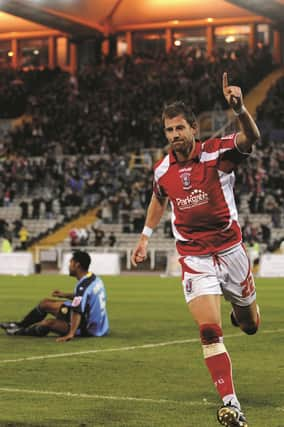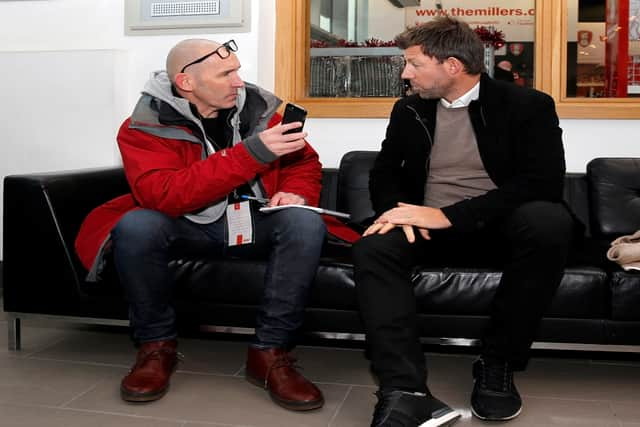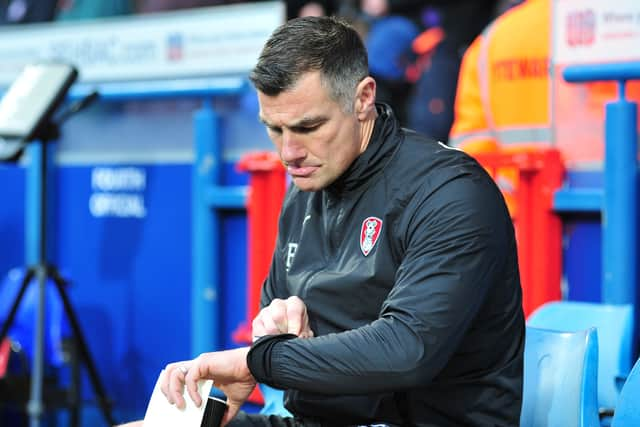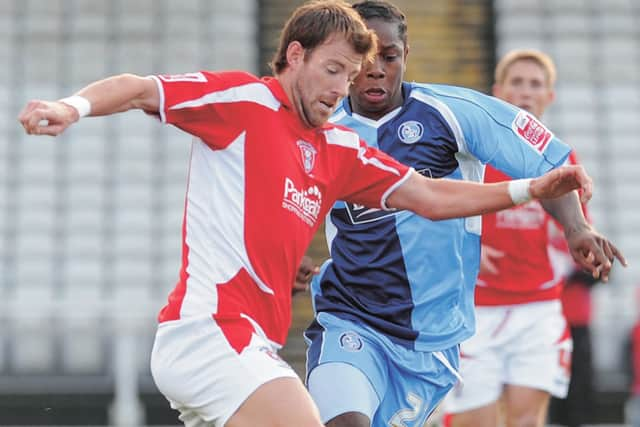Drewe Broughton: The ex-Rotherham United striker who fought back from depression, gambling and the brink of suicide to start a new life


Things hadn't worked out at Milton Keynes Dons and, with the 2008/09 season fast approaching, the much-travelled striker needed a club.
The Millers offered him £250 weekly and a short-term deal. So what if Broughton had been earning £1,800 at the Dons? He snatched off Rotherham boss Mark Robins' hand and headed to Don Valley Stadium.
Advertisement
Hide AdAdvertisement
Hide AdThe player had been a tortured soul all his life, his desire to succeed and the inner voice that went with it tormenting him since childhood.
“I'd just given up, I'd surrendered against life when Rotherham came in for me,” he recalls. “I thought: 'All I've got is sweat and running around.'
“I just decided: 'I'm going to go up there, run around, have a laugh with the lads and see what happens.' That was my mentality I had for eight weeks and I played some of the best football of my life.”
Then the voice returned ...
“We signed Richie Barker and one day this voice in my head went: 'Do you really think you can keep Richie out of the team just by having a laugh?'” Broughton says. “Then, bang, bang, pressure, pressure ... my form went.”


Drewe with the Advertiser's Paul Davis
Advertisement
Hide AdAdvertisement
Hide AdThe Millers were the 17th stop in a 17-year journey incorporating 21 clubs. Little more than three years later, his playing days were over, his marriage had collapsed, he was estranged from his daughter, bankrupt, a gambling addict and a suicide risk.
Life is very different now and so is the 40-year-old I meet at AESSEAL New York Stadium after he's driven up from his home near Milton Keynes to be a guest at a pre-Christmas Rotherham match.
Bad traffic has made him late and he's rushing to make his appointment with me, but he's held up again, this time by the volume of fans who recognise him.
He's written a book, And Then What..?, about his experiences and has a box of copies with him. Eventually he has to stop and hand them out, like a dapper street-seller in winter coat and scarf, to supporters eager for a £12.97 slice of his troubled past and how the former Norwich City youngster turned it all around.
Advertisement
Hide AdAdvertisement
Hide Ad“It's in the book ...” He says that a lot as we talk about how he came back from the brink and now uses his past turmoil to guide young footballers bothered by voices of their own.
It's a more settled way of earning a living than accepting the Millers' modest offer 11 years ago.
“I came on a week-to-week contract. It was two weeks before the start of the season,” he remembers.
“I'd been on the bench most of the season before. I was 28 or 29. There weren't a lot of takers. Well, there were takers but they were at the other end of the country. I sat tight and sat tight.
Advertisement
Hide AdAdvertisement
Hide Ad“Then I come here on trial and played at Don Valley against Scunthorpe, me and Reuben Reid. I did okay but put too much pressure on myself ... 'I've got to play well, I've got to play well' ... and didn't play great.
“Mark Robins said to me: 'I've only got the money for one. I'm going to take Reuben.' I went back home and trained by myself. The season was starting in a week and he rings me again and says: 'Look, I'm trying to sign Richie Barker, it's going through, but I can't get him for another four or five weeks. I can give you £250.'”
Broughton would go on to make more appearances for the Millers than for all but two of his other clubs - Kidderminster Harriers and Rushden & Diamonds - but wherever he went, from Norwich to Peterborough United to Southend United to Wrexham, the voice went with him.
“You've got your own internal drive which actually puts more pressure on you than any manager or game ever could,” he says. “I'd think: 'I've got to play well today, I've got to win nine out of ten headers, I've got to score, I've got to assist, I've got to dominate their backline.' That's what I demanded of myself.
Advertisement
Hide AdAdvertisement
Hide Ad“Plus, of course, you're in an environment where the pressure is really on you anyway. I could be unbelievable and then just self-destruct at any minute.”
There had been an immediate connection with fans outside New York and there is with me when we finally sit down together. Broughton, 6ft 3in, handsome, still with the look of an athlete about him, is friendly and open, ready so bare his soul from the moment the tape starts running.
Barker is now assistant manager of the Millers and his former teammate is still bothered by how he handled the pair's rivalry at Don Valley.


Richie Barker
“I talk about an episode with Richie in the book,” he says. “I apologised to him for it. Such was the competitiveness inside, I could be horrible at times. It's not who I really was.
Advertisement
Hide AdAdvertisement
Hide Ad“I've got a lot of time for Rich. I like Rich. He's a nice man. I clashed with him. I clashed with everyone at some point. The voice would get that loud it'd overwhelm me, take over, and I'd belittle people.”
Broughton was saved by Sporting Chance, the Hampshire clinic set up by former Arsenal and England captain Tony Adams whose mental-health demons had led to alcoholism.
“I owe a huge debt of gratitude to Sporting Chance,” Broughton says. “I spoke to Tony when I was down there. He's an incredible man. That clinic ... it's like rebooting your system.
“You have 30 days in a forest in the middle of nowhere and you sit with yourself and realise where you went wrong, where that child who loved football and had a spark in his eyes got lost.
Advertisement
Hide AdAdvertisement
Hide Ad“It was a turning point. I found myself while I was in there and with the therapy since. How else did I get through it? I have this incredibly powerful drive. I always have done. When it was misused, I'd go wrong. It's a weakness and a strength. Now I use it the right way.”
Having studied biomechanics and injuries, Broughton spent more than three years as a private physical mentor to Premier League players before an invitation to work with a teenage prospect struggling with depression saw him find his true vocation.
“Nothing will replace playing - the physical combat, the adrenaline,” Broughton says. “But I'm in a great place.
“I work with six top young players and I do some motivational speaking in the City. I'm very lucky.
Advertisement
Hide AdAdvertisement
Hide Ad“I wish I'd had the help when I was younger that I can give to young players now. Me now would have been brilliant for me at 17.
“You go from being in the Norwich dressing room as a teenager with manager Martin O'Neill telling all the senior pros what I wonderful player you are to playing in the lower leagues and scoring eight goals a season.


“Players today aren't more sensitive than they used to be, they're just ready to talk about it more. Older generations like the one of Tony Adams ... players used to just go and get drunk until they wanted to kill themselves or became wife-beaters or something.
“One of my young players said to me: 'This voice in my head in training told me: 'Stamp on him.' I caught the player on the shin and he was rolling about on the ground.'
Advertisement
Hide AdAdvertisement
Hide Ad“I told him: 'Tomorrow you won't do it but that voice will always be there.'”
Today, Broughton can control the voice. He married again a year ago and is preparing for fatherhood a second time, having also been reconciled with Talia, 23, his daughter from his first marriage.
“I have a beautiful wife, Helen,” he grins. “We had a lovely wedding in the Lake District and loads of players came. We're expecting in April. I have Talia three days a week.”
Our time together is drawing to a close and he's hoping to catch up later with Paul Warne, the boss who has won promotion to from League One and kept Rotherham competitive in the Championship since taking the hot-seat in April 2017 .
Advertisement
Hide AdAdvertisement
Hide Ad“Despite all the clubs I've had, I didn't have many managers who were able to keep the pressure off the players,” he says. “I think Warney looks like he's doing that very well.
“That's Warney's nature. He's a very deep man. I went to Wigan on loan when I was 18 or 19 and Warney was there. Then Mark Robins brought Warney back to Rotherham for a second spell as a player.
“I had a good relationship with him. But I was so tortured all the time that I would isolate myself a lot and not get involved in the banter. Then, all of a sudden, I'd be at the centre of the banter, before isolating myself again. “It was a constant Jekyll and Hyde in my head.”
And Then What..? is selling well and the author, who will always have to mute the mental message telling him he has to be the best, will be pleased by the five-star rating reviewers have given it on Amazon.
Advertisement
Hide AdAdvertisement
Hide Ad“I still get a voice now,” Broughton admits. “If I'm in a queue in the supermarket and someone pushes in, the voice says: 'Go and headbutt him.' I tend not to listen to it today. That's the key - don't listen to it but don't bury it. Laugh at the 'shadow' side.”
If you want more of this harrowing, uplifting story, it's in the book. Written by the man almost broken by a voice finally finding his real one.
And Then What..? Available from the Club Shop and at www.drewebroughton.com/publications
**********************************************************
Help at hand from friends in the Premier League
A REFORMED Drewe Broughton turned to his top-flight pals when he emerged from the Sporting Chance clinic determined to put his life back on track.
Advertisement
Hide AdAdvertisement
Hide AdThe former player had a history of studying biomechanics and injury and wanted to put it to good use.
“I had five Premier League mates and I rang them all and said: 'Boys, can you give me some of your time?',” he says. “I had to get a job. I had no money. Luckily, all of them did.
“I'd studied unbelievable stuff. A lot of them had pain injuries, recurring things, and I shifted a lot of it for them. Craig Bellamy was one of them.
“Bellers had just joined Cardiff City from Man City and gave me two hours. He said: 'Look, Mate, it's my knee - five operations. I need to play this season and I can't play without pain.'
Advertisement
Hide AdAdvertisement
Hide Ad“I had two hours with him, he went in and trained, came back and said: 'Wow, I've not felt that speed for a while.' He gave me a day or two days a week and I was up and running.”
In the end, Broughton worked with 30 players, including England stars Harry Kane, Alex Oxlade-Chamberlain and Theo Walcott, before turning to the mental side of the game.
**********************************************************
Using his past to guide stars of future
DREWE Broughton knew when he first helped a struggling young player kick-start his career that this was the job for him.
The one-time striker had been working with Premier League stars on their physical fitness when the invitation three and a half years ago to meet with a Norwich City youngster suffering from depression saw him take a different path.
Advertisement
Hide AdAdvertisement
Hide Ad“My brother was the Academy director at Norwich and said he had a young player who was depressed,” Broughton says. “The player had been working with a sports psychologist but it wasn't having any impact.
“I went and talked to him and he related to everything I went through. He never looked back and started to really realise his potential. I'm thinking: 'There's something in this.'
Having coached Luton Town's under-15 side, Broughton turned down the chance to take over the U-21 set-up, knowing it wasn't right for him.
“I wouldn't toe the line. I wouldn't ban chocolate and sweets,” he says. “They're kids.”
Advertisement
Hide AdAdvertisement
Hide AdHe began working individually with two young players experiencing self-doubt before being introduced to two members of the England youth ranks.
“It's gone from there,” Broughton says. “I did some work with Sky TV and one of their pundits, Phil Thompson, who played in that all-conquering Liverpool sides of the late 1970s and early 80s, was very complimentary.
“He talked of players in Liverpool's heyday who couldn't fit in at Anfield and were discarded because they were seen as 'mentally weak'. He wonders now if they were struggling then.”
Broughton is convinced his own problems were a combination of nature and nurture.
Advertisement
Hide AdAdvertisement
Hide AdHe says: “I remember the intensity I had as a kid, being in a bedroom at seven or eight years old, looking out and watching other kids playing football in the street and thinking: 'I've got to get to the top, I've got to be better than that.'
“I used to go out running by myself and every night I would play football on my own against the wall. I had this obsessive nature. I grew up somehow controlling that beast inside.
“I've looked into all. I've had years of therapy, I've had psychotherapy, I've done rehab. I've done all the work on my childhood, my dad leaving when I was six and all that stuff. It was beyond all that. It was this voice inside me.
“Like so many, I just needed calming and some love from management, to be asked how I was feeling and given a strong response.”
These articles first appeared in the Advertiser